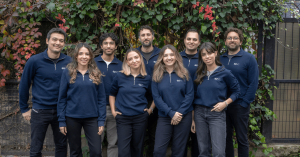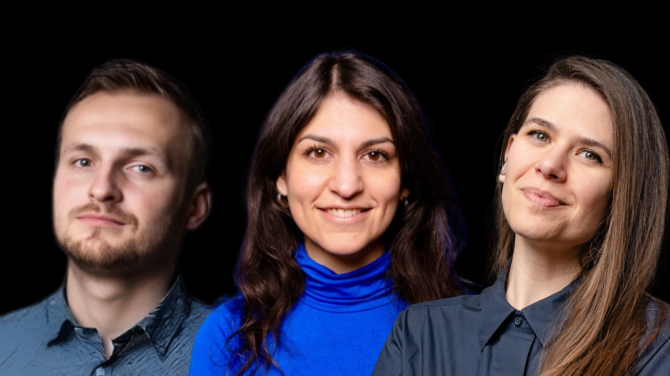Venture capital might look like pitch decks, networking events, and the occasional headlines about a unicorn exit—but behind the scenes, it’s a mix of financial insight, people skills, and relentless curiosity. If you’re thinking about starting a VC career, here are the skills that will get you in—and keep you in the game.
We asked three insiders from Central and Eastern European VC funds what makes someone successful in this fast-paced, ever-evolving world. Here’s what they told us.
Start with curiosity
VCs see hundreds of ideas every year. The good ones spot patterns. The great ones spot potential—especially when it’s not obvious.
“One key trait I recognize time and time again is curiosity,” says Adam Bočev from Czech Founders. “No matter what comes through the door, you want to understand the founders’ vision before passing judgement. At times, it is too easy to decline an idea before evaluating who the founders are and what is their original insight they’re bringing to table.”
VC isn’t about snapping to conclusions. It’s about digging deeper. The best VCs are the ones asking, What’s their unique insight? What are they seeing that others don’t?
If you’re not naturally curious—about markets, technologies, or how people think—it’s going to be a tough ride.
Mindset over models
Yes, Excel matters. But mindset matters more.
“Everyone knows the checklist,” says Gabriela Dia from GapMinder. “Financial modeling, market sizing, deal structures… But VC isn’t won in Excel—it’s won in conversations, convictions, and context.”
VC is a constant balancing act between the numbers and the narrative. One minute you’re analyzing CAC/LTV ratios. Next, you’re evaluating a founder’s pitch for a future that doesn’t exist yet.
“What separates good from great is mindset,” Gabriela says. “You need to think fast, decide faster, and still be humble enough to listen. You jump from AI in healthcare to logistics in emerging markets in the same hour, with no script, and you’re expected to have an opinion.”
Pattern recognition helps. So does empathy. Great VCs read people as well as they read data.
Communication is everything
Ask anyone in VC and they’ll tell you—it’s a people business. No people skills, no deals.
“The most important trait that helped me was being extremely extroverted,” says Stefan Krstevski from Inovo VC. “I can strike up a conversation with anyone. That’s crucial in VC.”
But it’s not just about being outgoing. Stefan breaks communication down into three layers:
- Bonding quickly and reading people authentically
- Diplomacy—especially when giving tough feedback
- Building and maintaining long-term relationships
Whether you’re meeting a founder for the first time or delivering a polite no to someone’s life’s work, how you say things matters just as much as what you say.
Analysis still counts—just don’t get lost in it
Once you’ve connected with a founder, it’s time to switch gears and evaluate the opportunity. How big can it get? What’s the business model? Where are the risks?
“You need structured problem-solving,” says Stefan. “At Inovo, we often meet a founder on a Friday and need to close by Tuesday. You need to process fast and present sharp. No one’s going to read a 60-page deck.”
Gabriela agrees: “You have to hold both types of information in your head—quantitative precision and qualitative judgment—and know when to lean on which.”
The financial skills—market research, modeling, cap tables—can be learned. But clarity of thought and the ability to synthesize fast? That’s what gets you noticed.
Sourcing is a superpower
You can’t invest in what you don’t find. And great founders aren’t replying to cold emails.
“You need to activate your network,” says Stefan. “The best leads come through warm intros—from angels, founders we’ve backed, people we trust.”
That means being present in your ecosystem, building relationships over time, and being the kind of person others want to send deals to.
Networking isn’t a side hustle in VC. It is the job.
You’re on your own (kind of)
One last thing: if you’re coming from a structured background—consulting, banking, corporate—you might be in for a culture shock.
“In consulting, everything is clearly structured,” Stefan says. “You get tasks, you deliver. In VC, you build your own pipeline, run your own process, and take full ownership. No one tells you what to do.”
Also, VC is an ambiguous game, Gabriela says: “You need to make quick decisions with incomplete information and have the confidence to stand by them—and the humility to change course when you’re wrong.”
That kind of autonomy can be freeing—or overwhelming. Either way, you need to be self-directed, resilient, and motivated by the long game.
Thinking of jumping in? VC isn’t a checklist job. It’s a messy, people-first, insight-driven career where your edge comes not just from what you know, but how you think. If that excites you, you might just be in the right place.








